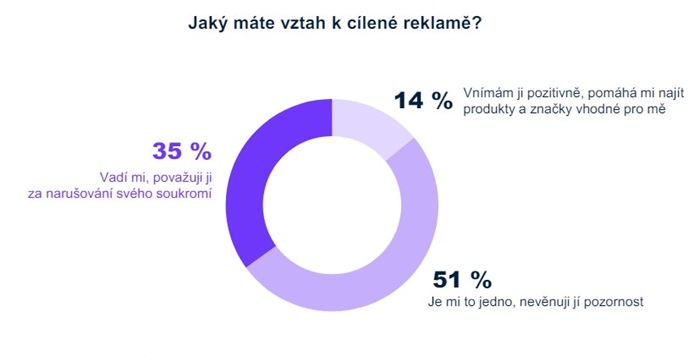In the Czech population in general, a negative attitude towards advertising prevails. Up to 83% of the Czech online population finds the amount of advertising in the media intolerable. Almost half (49%) perceive advertising negatively, while only less than a tenth (9%) perceive it positively. The rest describe their attitude towards advertising as neutral. This is according to research by Nielsen and ResSolution Group, the results of which were presented by Hana Friedlaenderova at the Innovation Day conference. The research was conducted on a representative sample of the Czech national panel (N=522) of the internet population over 15 years old in 2024.
About half of the Czech online population (51%) is indifferent to targeted advertising and does not pay attention to this type of advertising. More than a third (35%) are bothered by targeted advertising and perceive it as an invasion of privacy. On the other hand, 14% perceive targeted advertising positively because it helps them find relevant products.
 Source: Nielsen / ResSolution Group, N=522, Czech online population 15+, CNP, 2024
Source: Nielsen / ResSolution Group, N=522, Czech online population 15+, CNP, 2024The research also showed that online ad blocking tools are most commonly used on desktops (36%) and laptops (29%), with slightly lower usage of ad blockers on mobile phones and tablets (15% and 14% respectively).
The absence of advertising in the offerings of pay video-on-demand providers is one important motivator to pay for content. But while the vast majority of subscribers agree that paid video services should be completely ad-free, if the provider offers a lower subscription price in exchange for the ability to watch at least a certain amount of ads, in that case up to 47% of subscribers are willing to accept ads.
Although people are already quite oversaturated with advertising, marketing experts here and around the world believe that advertising budgets will grow faster in 2024 than in the past year. According to the results of the Nielsen Annual Marketing Report 2024, a regular global study, up to 72% of global marketers expect advertising budgets to increase, compared to only 64% in 2023. A total of 1,514 professionals from different regions around the world were surveyed as part of the study. However, digital channels in particular are set to strengthen. "However, advertisers should not forget about brand building when allocating their budgets and selecting communication channels, as performance-based marketing does not reach new customers enough, leading to brand erosion over time. Brand building is important in terms of long-term sales. That's why it is still worth combining traditional media such as TV or radio with digital ones in a campaign," comments Friedlaenderova on the results of the study.
Watching TV remains one of the most popular activities among Czech households. The average daily TV viewing time (ATS) last year in the 15+ target group was almost 3 hours and 40 minutes. This figure includes live and delayed (within 7 days of broadcast) viewing of TV stations on TV sets. The share of deferred viewing last year was 11% of total viewing, with classic live viewing accounting for a dominant 89% of this time. At the same time, the TV set is changing from a pure TV entertainment device to a digital device. Continuous research by the ATO, a supporting project for the Electronic Television Viewership Measurement Project, shows that 88% of households have at least one working TV set at home. Of these, 52% have it connected to the internet (source: ATO).
Source: mediaguru.cz

